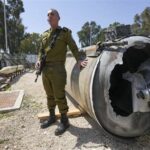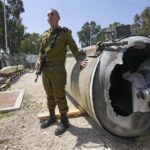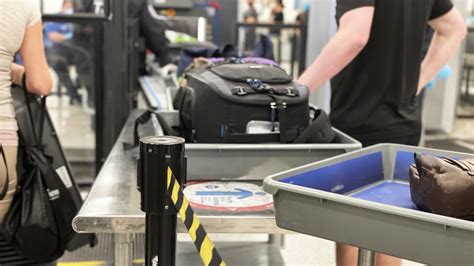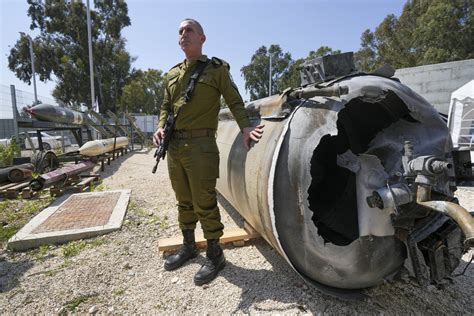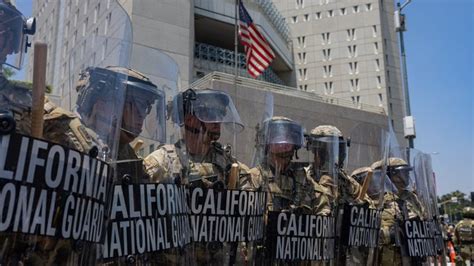
An immigration protester’s impassioned speech directed at National Guard members deployed to the U.S.-Mexico border in Eagle Pass, Texas, has gone viral, showing a tense yet respectful exchange between a civilian and the military personnel. The protester, identified as a self-proclaimed “patriot,” questioned the Guard members’ purpose and morality in enforcing border policies, prompting a silent response captured on video and widely circulated on social media.
The incident occurred during a period of heightened tensions surrounding immigration enforcement at the southern border, particularly in Eagle Pass, where Texas authorities have implemented stringent measures under Operation Lone Star. The video, originally posted on X (formerly Twitter), shows the protester addressing a line of National Guard members, questioning their role in preventing migrants from entering the country. “Are you all aware that you’re standing in the way of people trying to come here to save their lives?” the protester asked, his voice carrying across the open space. He further challenged their sense of duty, asking, “Are you aware that you’re hurting families, that you’re traumatizing people?”
The protester’s monologue continued for several minutes, during which he criticized the policies he believed the Guard members were enforcing. He specifically referenced the potential for asylum seekers to be legitimate refugees fleeing dangerous conditions in their home countries. “Are you aware that these people are turning themselves in because they’re seeking asylum?” he stated, adding, “Do you even care?” Throughout the speech, the National Guard members remained stoic and silent, maintaining their positions and not engaging in verbal response. This silence, captured on video, has become a key point of discussion online, with some interpreting it as a sign of internal conflict or disagreement within the ranks, while others see it as adherence to military protocol.
The location of the protest, Eagle Pass, Texas, is significant due to its central role in the ongoing debate over border security. The state of Texas, under Governor Greg Abbott, has taken a more assertive approach to border control, implementing measures that have drawn both support and criticism. Operation Lone Star, initiated in 2021, has involved the deployment of National Guard troops and state troopers to the border to deter illegal immigration and combat drug trafficking. This operation has been met with legal challenges and accusations of overreach, but Texas officials maintain that it is necessary to protect the state and the nation.
The video has sparked widespread debate across social media platforms, with users expressing a range of opinions on the protester’s message and the Guard members’ response. Some have praised the protester for speaking out against what they see as inhumane policies, while others have defended the National Guard members, arguing that they are simply following orders and fulfilling their duty. The silence of the Guard members has also been interpreted in various ways, with some suggesting it indicates a silent agreement with the protester’s sentiments, while others believe it is a reflection of military discipline and the chain of command. The discussion highlights the complex and often conflicting perspectives on immigration enforcement and the role of the military in domestic affairs.
The broader context of the incident involves the ongoing political and legal battles surrounding immigration policy in the United States. The Biden administration has faced pressure from both sides of the political spectrum, with Republicans calling for stricter border enforcement and Democrats advocating for more humane treatment of asylum seekers. The situation in Eagle Pass is a microcosm of this larger national debate, with the deployment of National Guard troops representing a significant escalation of border security measures. The legal challenges to Operation Lone Star underscore the constitutional questions raised by the state’s actions, particularly regarding the division of authority between the federal government and state governments on immigration matters.
The viral nature of the video also speaks to the power of social media in shaping public discourse on sensitive issues. The rapid dissemination of the footage has allowed for a wide range of voices to be heard and has amplified the debate surrounding immigration policy. The comments and reactions to the video reflect the deep divisions within American society on this issue, with individuals expressing strong opinions on both sides. The incident serves as a reminder of the importance of engaging in respectful and informed dialogue on complex issues, even when there are significant disagreements.
Furthermore, the incident underscores the emotional toll that immigration enforcement can take on both migrants and those involved in enforcing border policies. The protester’s impassioned plea reflects the desperation and vulnerability of asylum seekers, while the silent response of the National Guard members may reflect the difficult position they are in, caught between their duty to follow orders and their own personal values. The situation highlights the human dimension of immigration policy and the need for compassion and understanding in addressing this complex issue.
The long-term implications of the incident are uncertain, but it is likely to further fuel the debate over immigration policy and the role of the military in domestic affairs. The video may also prompt further scrutiny of Operation Lone Star and other border security measures, potentially leading to legal challenges and political pressure on state and federal officials. Ultimately, the incident serves as a reminder of the need for comprehensive immigration reform that addresses the root causes of migration, provides a pathway to citizenship for undocumented immigrants, and ensures the humane treatment of asylum seekers.
The silence of the National Guard members has been a particularly significant aspect of the video, drawing considerable attention and speculation. While there has been no official statement from the National Guard regarding their response, military experts suggest that their silence is consistent with standard operating procedures. Service members are typically instructed not to engage in political debates or express personal opinions while on duty, particularly in situations where their actions could be interpreted as taking a position on a controversial issue. This protocol is designed to maintain the neutrality of the military and avoid the appearance of political partisanship. However, the silence can also be interpreted as a sign of internal conflict or disagreement, particularly in situations where service members may have personal reservations about the policies they are being asked to enforce.
The protester’s reference to asylum seekers and their legal right to seek protection in the United States is also a critical aspect of the incident. Under U.S. and international law, individuals who fear persecution in their home countries have the right to seek asylum, regardless of how they enter the country. The asylum process involves a legal determination of whether the individual has a credible fear of persecution and meets the criteria for asylum. Critics of current border policies argue that measures such as Operation Lone Star may impede the ability of asylum seekers to access the legal process and potentially violate international obligations. The debate over asylum policy is a central component of the larger immigration debate, with differing views on the appropriate balance between border security and humanitarian concerns.
The role of social media in amplifying the incident and shaping public opinion cannot be overstated. The video’s rapid spread across platforms like X, Facebook, and YouTube has allowed it to reach a vast audience and has generated a wide range of responses. Social media has become a powerful tool for activists and advocacy groups to raise awareness about issues and mobilize support for their causes. However, it also presents challenges in terms of ensuring the accuracy and reliability of information and combating misinformation. The comments and reactions to the video reflect the polarized nature of online discourse, with individuals often retreating into echo chambers and reinforcing their existing beliefs. The incident serves as a reminder of the importance of critical thinking and media literacy in navigating the complex landscape of social media.
The legal challenges to Operation Lone Star represent a significant aspect of the broader context surrounding the incident. Civil rights groups and legal organizations have filed lawsuits against the state of Texas, alleging that the operation violates federal law and infringes on the rights of immigrants. These lawsuits raise constitutional questions about the division of authority between the federal government and state governments on immigration matters. The U.S. Constitution grants the federal government exclusive authority over immigration policy, but states have argued that they have the right to take action to protect their borders. The courts have generally sided with the federal government on these issues, but the legal battles over Operation Lone Star are ongoing and could have significant implications for the future of immigration enforcement.
The incident in Eagle Pass also highlights the need for a more comprehensive and humane approach to immigration policy. Many experts argue that the current system is broken and fails to address the root causes of migration, such as poverty, violence, and political instability in Central America. They call for a combination of border security measures, increased investment in economic development in the region, and a pathway to citizenship for undocumented immigrants who are already living in the United States. They emphasize the need for a system that is both fair and effective, and that reflects American values of compassion and opportunity. The debate over immigration policy is likely to continue for the foreseeable future, and incidents like the one in Eagle Pass will continue to shape the public discourse and inform the political debate.
The ethical considerations surrounding the National Guard’s role are complex. While they are tasked with following orders, the morality of those orders, particularly when dealing with vulnerable populations, is often debated. This incident throws light on the tension between duty and conscience, especially when military personnel are deployed in situations that involve sensitive humanitarian issues. The long-term psychological impact on the Guardsmen is another concern, as being involved in potentially traumatic situations at the border can lead to moral injury and mental health challenges.
Moreover, the economic implications of Operation Lone Star are noteworthy. The deployment of the National Guard and the implementation of stricter border control measures involve significant financial costs for the state of Texas. These costs include personnel expenses, equipment purchases, and infrastructure development. Critics of the operation argue that these funds could be better used to address other pressing needs in the state, such as education, healthcare, and infrastructure improvements. The economic impact of immigration itself is also a subject of debate, with some arguing that immigrants contribute to the economy by filling labor shortages and creating jobs, while others contend that they place a burden on public resources.
The incident also raises questions about the training and preparation of National Guard members for their role at the border. It is essential that they are adequately trained in de-escalation techniques, cultural sensitivity, and the legal aspects of immigration enforcement. They should also be provided with access to mental health services to help them cope with the potential stress and trauma associated with their duties. The lack of visible engagement from the Guard members in the video could indicate a lack of clear communication protocols or a directive to avoid any interaction that could be misconstrued.
The humanitarian aspect of the border situation is undeniably critical. The journey to the U.S.-Mexico border is fraught with danger for migrants, who often face exploitation, violence, and harsh environmental conditions. Organizations working on the ground provide essential services such as food, water, medical care, and legal assistance. The incident in Eagle Pass underscores the need for a coordinated and compassionate response to the humanitarian needs of migrants, ensuring that their rights are protected and that they are treated with dignity.
The future of immigration policy in the United States remains uncertain, but the incident in Eagle Pass serves as a potent reminder of the complexities and challenges involved. It highlights the need for a comprehensive approach that addresses the root causes of migration, provides a pathway to citizenship for undocumented immigrants, and ensures the humane treatment of asylum seekers. It also underscores the importance of engaging in respectful and informed dialogue on this issue, recognizing the diverse perspectives and experiences of all stakeholders.
The event is now being utilized across different political spectrums to further cement pre-existing beliefs. Advocates for stricter border control are using it to highlight the necessity of National Guard deployment, while those advocating for immigration reform are using it to showcase what they perceive as inhumane treatment of asylum seekers. The incident, therefore, becomes a flashpoint in the broader cultural and political war regarding immigration.
The potential for escalation at the border also remains a significant concern. The presence of armed National Guard members can create a tense and potentially volatile situation, particularly when dealing with vulnerable populations. The risk of misunderstandings or miscalculations that could lead to violence is ever-present. It is essential that all parties involved exercise restraint and prioritize de-escalation in order to avoid any tragic outcomes. The role of oversight and accountability is also crucial in ensuring that the National Guard operates within the bounds of the law and respects the rights of all individuals.
The ripple effects of the Eagle Pass incident extend beyond the immediate border region. It has implications for national politics, international relations, and the global debate on migration and human rights. The United States’ approach to immigration is closely watched by other countries around the world, and the events in Eagle Pass could influence their own policies and practices. The incident also underscores the importance of international cooperation in addressing the root causes of migration and providing assistance to refugees and asylum seekers.
The video also inadvertently highlights the power dynamics at play. A single civilian, armed with words, confronts a line of uniformed National Guard members equipped with the authority of the state. This David and Goliath scenario resonates with many who feel voiceless in the face of large governmental structures and policies. The protester, in essence, becomes a symbol for those who feel unheard, adding another layer of complexity to the narrative.
Finally, the lasting impact of such incidents on community relations should not be overlooked. Border communities are often deeply divided on immigration issues, and events like the one in Eagle Pass can further exacerbate tensions. It is essential that local leaders and organizations work to promote understanding and build bridges between different groups. This requires creating spaces for dialogue, fostering empathy, and addressing the underlying issues that contribute to division. The long-term health and well-being of border communities depend on their ability to overcome these challenges and create a more inclusive and welcoming environment for all.
The incident serves as a stark reminder of the ongoing challenges and complexities of immigration policy in the United States. It underscores the need for comprehensive reform that addresses the root causes of migration, provides a pathway to citizenship for undocumented immigrants, and ensures the humane treatment of asylum seekers. It also highlights the importance of engaging in respectful and informed dialogue on this issue, recognizing the diverse perspectives and experiences of all stakeholders. Only through a concerted effort to address these challenges can the United States create a more just and equitable immigration system that reflects its values and ideals.
Frequently Asked Questions (FAQ):
1. What exactly happened in Eagle Pass, Texas, involving the ICE protester and the National Guard?
In Eagle Pass, Texas, a self-proclaimed “patriot” immigration protester delivered an impassioned speech to National Guard members deployed to the U.S.-Mexico border as part of Operation Lone Star. The protester questioned the Guard members’ role in preventing migrants, particularly asylum seekers, from entering the country, challenging their morality and sense of duty. The National Guard members remained silent throughout the speech, a reaction captured on video and widely circulated on social media, sparking debate about immigration policy and the role of the military.
2. Why were National Guard members deployed to the U.S.-Mexico border in Eagle Pass?
National Guard members were deployed as part of Operation Lone Star, an initiative launched by Texas Governor Greg Abbott in 2021. The operation aims to deter illegal immigration and combat drug trafficking at the southern border. Texas officials claim it is necessary to protect the state and the nation, while critics argue it is an overreach of state authority and potentially violates federal law.
3. What were the key arguments made by the immigration protester in the viral video?
The protester questioned whether the National Guard members were aware that they were “standing in the way of people trying to come here to save their lives.” He asked if they were aware that they were “hurting families, that you’re traumatizing people?” and asserted that many of these individuals were seeking asylum. He challenged their awareness of the plight of asylum seekers fleeing dangerous conditions and turning themselves in to authorities.
4. How has the National Guard responded to the video and the protester’s speech?
The National Guard members remained silent throughout the protester’s speech. There has been no official statement from the National Guard regarding the incident. Military experts suggest this silence is consistent with standard operating procedures, which typically instruct service members not to engage in political debates or express personal opinions while on duty. This is intended to maintain the neutrality of the military.
5. What are the legal and ethical implications of deploying the National Guard to enforce immigration policies at the border?
The deployment of the National Guard raises several legal and ethical questions. Legally, there are questions about the division of authority between the federal government and state governments on immigration matters, as the U.S. Constitution grants the federal government exclusive authority over immigration policy. Ethically, there are concerns about the morality of military personnel enforcing policies that may conflict with humanitarian principles, particularly when dealing with vulnerable populations such as asylum seekers. The deployment also raises questions about the training and preparation of National Guard members for these roles and the potential psychological impact on them.


